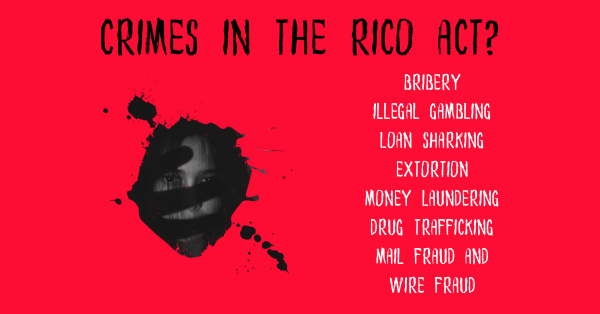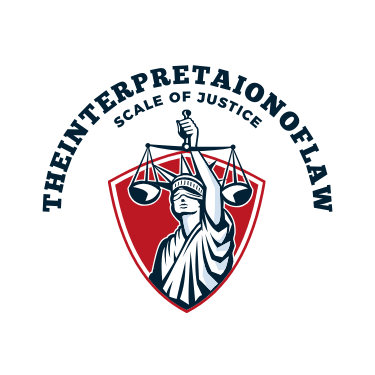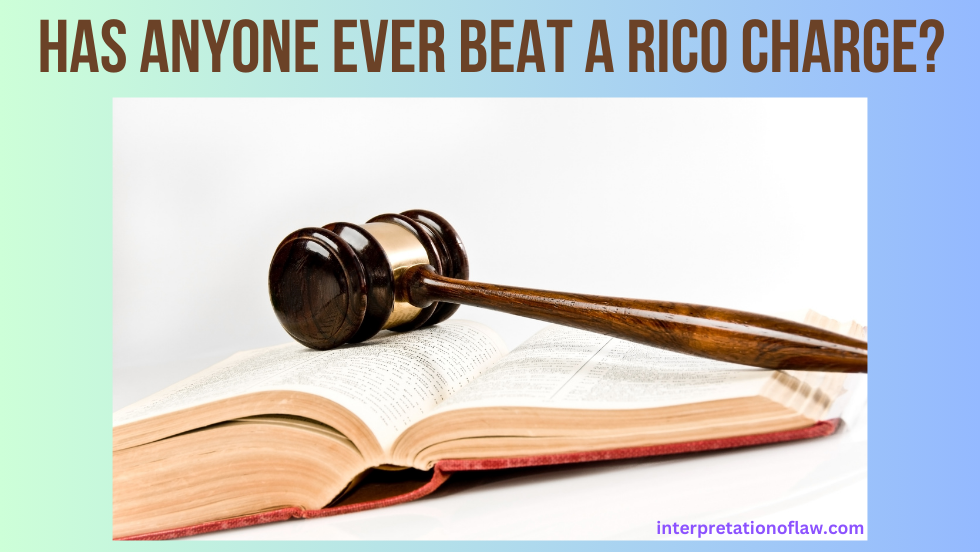Are you or someone you know facing charges under the Racketeer Influenced and Corrupt Organization Act (RICO)? Not only is it an intimidating acronym, but a RICO charge can also carry with it some severe criminal penalties. It’s essential to understand what constitutes a RICO charge and whether these charges are beatable in court.
In this article, we strive to simplify this complicated law so that you can fully understand how it applies to your situation and assess potential paths toward a favorable outcome. We will also discuss how can you beat a Rico charge. So, let’s dive in and learn more about this powerful law.
What is a RICO charge?
RICO, or the Racketeer Influenced and Corrupt Organizations Act, is a U.S. federal law enacted in 1970 to address organized crime. Specifically, the RICO Act was designed to combat criminal organizations’ infiltration and corruption of legitimate businesses and government entities.
The RICO Act was part of the broader Organized Crime Control Act to strengthen law enforcement efforts against organized crime. One crucial aspect of RICO is its provision for criminal and civil cases. This means that not only can a person be charged criminally under this legislation, but they can also face civil lawsuits.
What are the Crimes in the RICO Act?

To be charged under the RICO Act, individuals or entities must be involved in a pattern of racketeering. This essentially means participating in a series of criminal activities over time, usually as part of an organized enterprise. Some of the typical offenses that may lead to a RICO charge include:
- Bribery
- Illegal gambling
- Loan sharking
- Extortion
- Money laundering
- Drug trafficking
- Mail fraud and wire fraud
Penalties for RICO Charges:
The consequences of a RICO charge are more severe than those of other criminal charges. Individuals found guilty of a RICO offense face:
- Up to 20 years in prison per RICO count
- Fines of up to twice the amount of proceeds obtained through racketeering activities
- Forfeiture of assets related to racketeering activities
- Potential liability for treble damages in civil RICO cases
How someone charged for RICO?
Two main elements must exist for someone to get a RICO charge.
- The pattern of criminal activity. There must be a minimum of two RICO predicate offenses committed within 10 years.
- A criminal enterprise. A criminal gang or a group must exist or be behind illegal activities.
Has anyone ever beat a RICO charge?
Has anyone beat a Rico case? Yes, there have been cases where individuals have successfully fought and won RICO charges. In some instances, the charges were dismissed due to a lack of evidence or improper application of the law. Below are some people in the U.S. who beat a RICO charge.
John Doe’s 1995 Acquittal
In the 1995 case involving John Doe, solid legal representation was the key to his acquittal. His defense team argued that the prosecution failed to meet the burden of evidence required to establish that Doe was involved in a pattern of racketeering activity connected to an enterprise involved in interstate or foreign commerce. By challenging the prosecution’s case on all fronts, Doe’s legal team created enough doubt in the jury members’ minds, ultimately leading to Doe’s acquittal on the RICO charge.
Brian Harper
Harper was captured and charged with a RICO offense following a wiretap investigation called Operation Shut Down the Hustle. Harper was alleged to be a violent gang member known as the Four Corners Hustlers.
This gang has violated the Illinois Street Gang, Racketeer Influenced, and Corrupt Organizations Act. However, the state dismissed the charges due to Harper’s comparatively lesser involvement in the crimes than other defendants.
Vagos biker gang
The Vagos Biker gang faced RICO charges in 2020, but the state dropped the charges against its members later that year. The court accused the gang of engaging in racketeering activities and being involved in a shootout, resulting in the death of the leader of a rival gang.
Winston Connor, II
Winston Connor II, a criminal defense attorney, faced RICO charges in February 2022. The charges stemmed from his alleged association with Slint Tate, a murder convict currently serving a life sentence for the 1999 murder of Vernie Milford, a deputy in Oklahoma.
High-Profile RICO Cases:
Some notable examples of high-profile RICO cases include:
- The Gambino Crime Family prosecution in the 1980s and early 1990s, where the federal government used RICO charges to dismantle the infamous mafia family structure;
- The Key West Police Department in Florida, where numerous officers were indicted under RICO for corruption and drug-smuggling activities in the early 1990s;
- More recently, the FIFA Corruption Scandal in which several critical international soccer officials were indicted under RICO charges for racketeering, wire fraud, and money laundering.
What Happens If You Are Accused of a RICO Violation?
Accusing a RICO violation can be a severe and potentially life-altering event. The Racketeer Influenced and Corrupt Organizations (RICO) Act is a powerful law that targets individuals who engage in organized criminal activities. If you are accused of a RICO violation, it is very essential to seek legal counsel immediately.
RICO charges can result in severe consequences, including hefty fines, lengthy prison sentences, and forfeiture of assets. The government has vast resources to investigate and prosecute RICO cases, so it is vital to have a skilled and experienced defense attorney on your side. The consequences of a RICO conviction can be devastating. However, with the right legal representation and a clear understanding of the charges against you, there is still hope for a positive outcome.
How do you beat RICO violtions?
How to beat a rico charge? Winning a RICO violation charge is no easy feat, but it is possible with the right approach and legal strategy. Some ways to potentially beat a RICO charge include:
- Challenging the validity of the pattern of criminal activity
- Proving that there was no existence of a criminal enterprise
- Providing evidence of entrapment or false accusation
- Demonstrating a lack of involvement in the alleged racketeering activities
- Bringing forth constitutional challenges to certain aspects of the RICO Act itself.
While successfully beating a RICO charge is challenging, it is not impossible. With the help of an experienced and skilled criminal defense attorney, individuals can build a strong case against RICO charges and potentially avoid severe penalties. However, the best way to beat a RICO charge is to refrain from engaging in any criminal activities that could result in a violation.
Prevention is always better than cure, and avoiding involvement in organized criminal activities can protect individuals from facing RICO charges. Understanding the severity of RICO violations and making responsible decisions to avoid any potential legal consequences is essential.
So, if you or someone you know is facing a RICO charge, seek legal assistance immediately and take the necessary steps to defend against these serious allegations. Remember, there is always hope for a positive outcome with the proper legal representation and strategy.
What is the Minimum Sentence for a Rico charge?
The minimum sentence for a RICO charge varies depending on the case’s specific circumstances and the offense’s severity. Generally, RICO charges can result in a minimum sentence of 20 years and up to life imprisonment. Individuals convicted of a RICO violation may also face hefty fines and asset forfeiture.
However, as seen in some of the cases mentioned above, the government may choose to dismiss or reduce RICO charges if there is not enough evidence to prove a pattern of criminal activity or an enterprise’s involvement. In these cases, individuals may face lesser sentences or even be acquitted.
Taking RICO charges seriously and seeking legal representation to mitigate the consequences and avoid a lengthy prison sentence is essential. The severity of RICO charges reinforces the need to refrain from engaging in illegal activities and make responsible decisions to protect oneself from potential legal repercussions.
RICO Charges in State and Federal Courts:
While RICO is primarily a federal law, states like New York, California, and Florida have enacted their own versions of RICO statutes. State RICO laws may differ regarding applicable offenses and punishments but generally aim to combat organized crime within state jurisdictions.
Proving a RICO Charge & Potential Consequences:
For prosecutors to secure a RICO conviction, they must prove:
- The existence of an organized enterprise;
- That the accused engaged in a pattern of racketeering activity over time, typically requiring at least two incidents of racketeering;
- That the accused’s actions directly impacted the enterprise or its activities.
Proving a RICO charge can be complex and challenging, often requiring elaborate investigations and substantial evidence to connect the dots between multiple criminal offenses and the individuals within the organization.
F.A.Q.s
What is the most famous RICO charge?
The Lucchese crime family, a prominent member of the “Five Families” that exerted control over organized crime in New York City, was successfully dismantled by prosecuting attorneys Gregory O’Connell and Charles Rose through the strategic implementation of RICO charges over a span of 18 months.
Why is RICO so serious?
RICO charges are taken very seriously because of the severe consequences they carry. The RICO Act was initially created to target organized crime activities and has since been expanded to include a wide range of illegal activities. As such, RICO charges can lead to lengthy prison sentences, hefty fines, and asset forfeiture. Additionally, the government often has extensive resources to investigate and prosecute RICO cases, making it challenging to defend against these charges.
What is the power of RICO?
One of the key powers of RICO is its ability to target not only individuals but also entire criminal organizations or enterprises. This means that even if an individual may not have committed a particular crime themselves, they can still be held accountable for the actions of their associates if they are part of a criminal enterprise. This broad power allows the government to dismantle organized crime structures and hold all involved parties accountable for their actions.
Why is RICO called RICO?
The Racketeer Influenced and Corrupt Organizations (RICO) Act was named after the Italian-American Mafia boss, James “Jimmy” Hoffa. His full name is James Riddle Hoffa, and the acronym “RICO” is derived from his initials, J.R.H. The act initially targeted organized crime activities, including those associated with the Mafia, hence the connection to Hoffa’s name.
However, since its enactment in 1970, RICO has been expanded to cover a wide range of illegal activities, making it a powerful tool for the government to combat various forms of organized crime. So, while the name RICO may have originated from Hoffa’s initials, it now represents a much broader and significant concept in the fight against criminal enterprises.
What is the Rico in Sons of Anarchy?
In Series 4, the term RICO is frequently employed when addressing the perilous situation faced by the club. This pertains to the “Racketeer Influenced and Corrupt Organizations Act,” a federal law in the United States that imposes supplementary and often substantial penalties for criminal activities carried out by organized criminal entities.
What is the Rico law in Georgia?
The Georgia RICO Act is a law in the U.S. state of Georgia that classifies a form of racketeering as a felony. Initially enacted on March 20, 1980, it is notable for its broader scope compared to the corresponding federal law, as it does not necessitate a pecuniary profit.
Thank you for reading our F.A.Q.s on RICO charges; we hope it provided valuable information and insights into this complex topic. Remember always to stay informed and make responsible choices.
Summary
We hope you think twice before engaging in illegal activities that may lead to RICO charges. The consequences are severe, and the government has a powerful tool to combat organized crime. Seeking legal representation and understanding the implications of RICO charges is crucial for anyone facing such allegations.
Remember, the best way to avoid RICO charges is to always stay on the right side of the law and make responsible decisions. So, stay informed and make wise choices to protect yourself from potential legal repercussions. Always consult a lawyer for specific legal advice regarding RICO charges or other criminal allegations.
More Related Post:
What is a False CPS Report?
Resources:
- https://www.ojp.gov/ncjrs/virtual-library/abstracts/rico-racketeer-influenced-and-corrupt-organizations-act-statute
- https://www.law.cornell.edu/wex/racketeer_influenced_and_corrupt_organizations_act_(rico)#:~:text=The%20Racketeer%20Influenced%20and%20Corrupt,of%20an%20organized%20criminal%20enterprise.
- https://en.wikipedia.org/wiki/Racketeer_Influenced_and_Corrupt_Organizations_Act

Carter Wilson is a licensed lawyer with over 10 years of experience in various legal fields. He is passionate about making law accessible to the general public and helping individuals navigate through complex legal matters.

